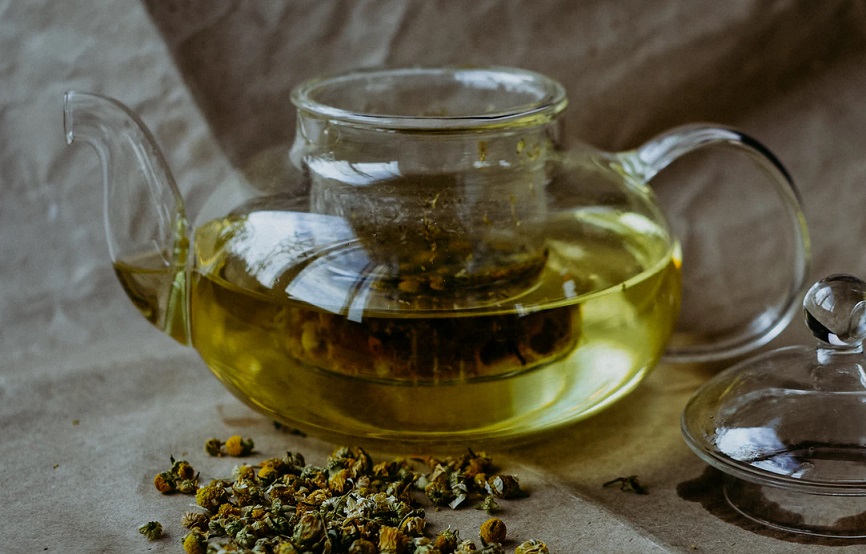Tea has a fascinating history. It’s thought to have been discovered accidentally during the Shang Dynasty by Chinese Emperor Shennong. He was a well-known herbalist and started his day drinking hot water to stave off germs. One morning, a camellia leaf fell into his hot water, and he relished the taste. Hence, ‘tea’ became part of his routine.
All ‘traditional’ tea comes from the Camellia Sinensis plant. The processing stage is vital when determining the type of tea produced. Tea generally undergoes a procedure called oxidation. The leaves are tumbled or macerated, which exposes their insides to oxygen. This allows the chlorophyll within the leaf to break down and release tannins, determining the flavor, color, aroma, and tea strength.
Green teas do not undergo the oxidation process, black tea is fully oxidized, and oolong teas sit somewhere in between. Tisanes are teas that do not contain the leaves of the Camellia Sinensis plant. They are infused flowers, roots, herbs, berries, and spices of other plants.
For centuries it has been known that tea can boost your immune system, fight uncomfortable inflammation, and ease stomach pains. Some brews provide more wellness advantages than others, but regularly drinking the right tea can have a lasting impact on your health.
1. Holy Basil Tisane
Holy Basil tea is used extensively in Ayurvedic medicine in India. It is commonly known as tulsi tea and made from the Ocimum Tenuflorum plant, which prolifically grows throughout Asia. Various studies show that holy basil tea significantly decreases stomach acid, which increases the life span of the mucus cells that protect the digestive tract from disease. The medicinal basil leaf can also reduce the presence of stomach ulcers and diminish any related pain.
2. Licorice Root Tisane
Although licorice tea is an acquired taste, it is used extensively in Egypt and China as traditional medicine. The tea soothes your stomach and can help repair and rebuild your stomach lining and improve overall gut health. It is incredibly potent, so it is advised that you drink it three times a day before meals for a week and then take a break from it for at least two weeks. Licorice can inhibit the growth of the bacteria that deteriorates the stomach lining or cause ulcers.
3. Camomile Tisane
Chamomile tea is made from the pretty yellow and white chamomile flowers. It’s known to be one of the best infusions for relaxation and for easing abdominal pain. The best chamomile tea has carminative and anti-inflammatory properties that help relieve bloating and cramps. Chamomile tea is a great stress reliever and can also improve sleep-related disorders.
4. Green Tea
Drinking green tea is one of the best and scientifically proven ways for gastrointestinal disorder prevention. Catechins, a type of natural phenol and antioxidant, are prevalent in green tea and easily absorbed into the intestines. The tea can accelerate the decrease of fatty deposits and increase metabolism. Green tea can help lessen inflammation and irritation in the stomach, affecting digestion, thus aiding many digestive problems. Be sure to drink green tea after each meal and limit consumption. It contains natural caffeine, which can induce insomnia, so try to avoid it just before you go to bed.
5. Black Tea
This flavorsome, fully oxidized tea contains tannins that can calm the inflamed lining of your intestines. Diarrhea can occur when the intestines swell, and black tea will help return your digestive system to normal. Black tea contains naturally occurring caffeine. It is best avoided just before bed so that you can have a good night’s sleep. Depending on your caffeine tolerance, try and only drink one or two cups each day.
6. Fennel Tisane
The Romans and Greeks believed that fennel offered vigor and wellness that would provide a long life. Research shows that fennel tea has antispasmodic and carminative properties that stimulate gastric juices and reduce pain. For centuries Chinese medicine practitioners have used fennel tea to treat gastroenteritis, indigestion, and hernias.
7. Peppermint Tisane
The leaves of the peppermint plant are known to relieve the pain associated with nausea and menstrual cramps. Peppermint is a hardy plant that can quickly be grown in most climates and is one of the best teas known to settle your stomach. Clinical studies show that peppermint inhibits pain receptors and can alleviate severe pain that originates from the colon. It’s best to avoid peppermint tea if you suffer from heartburn; it can prevent stomach bile from entering the esophagus, which causes acid reflux.
8. Ginger Tisane
For thousands of years, ginger tea has been the go-to cure for digestive problems. Ginger is a natural remedy for nausea and can also be used by people that suffer from travel queasiness or women suffering from morning sickness. The ginger tea packs quite a punch with its somewhat spicy kick. It offers numerous health and wellness benefits and has healing compounds to alleviate and upset stomach.
Conclusion
The world’s finest teas are easy to purchase and possess a whole host of health and wellness benefits. Choose the right tea can help you kill harmful bacteria and promote the growth of good bacteria. Many teas contain micronutrients, improve gut health, and relieve you from stomach pain, nausea, and diarrhea.

